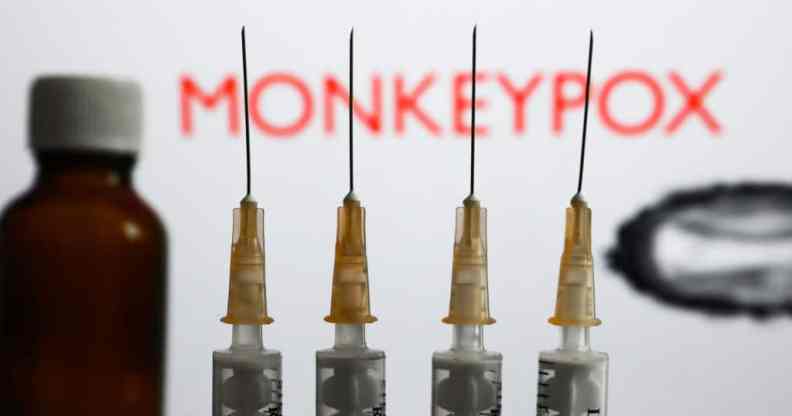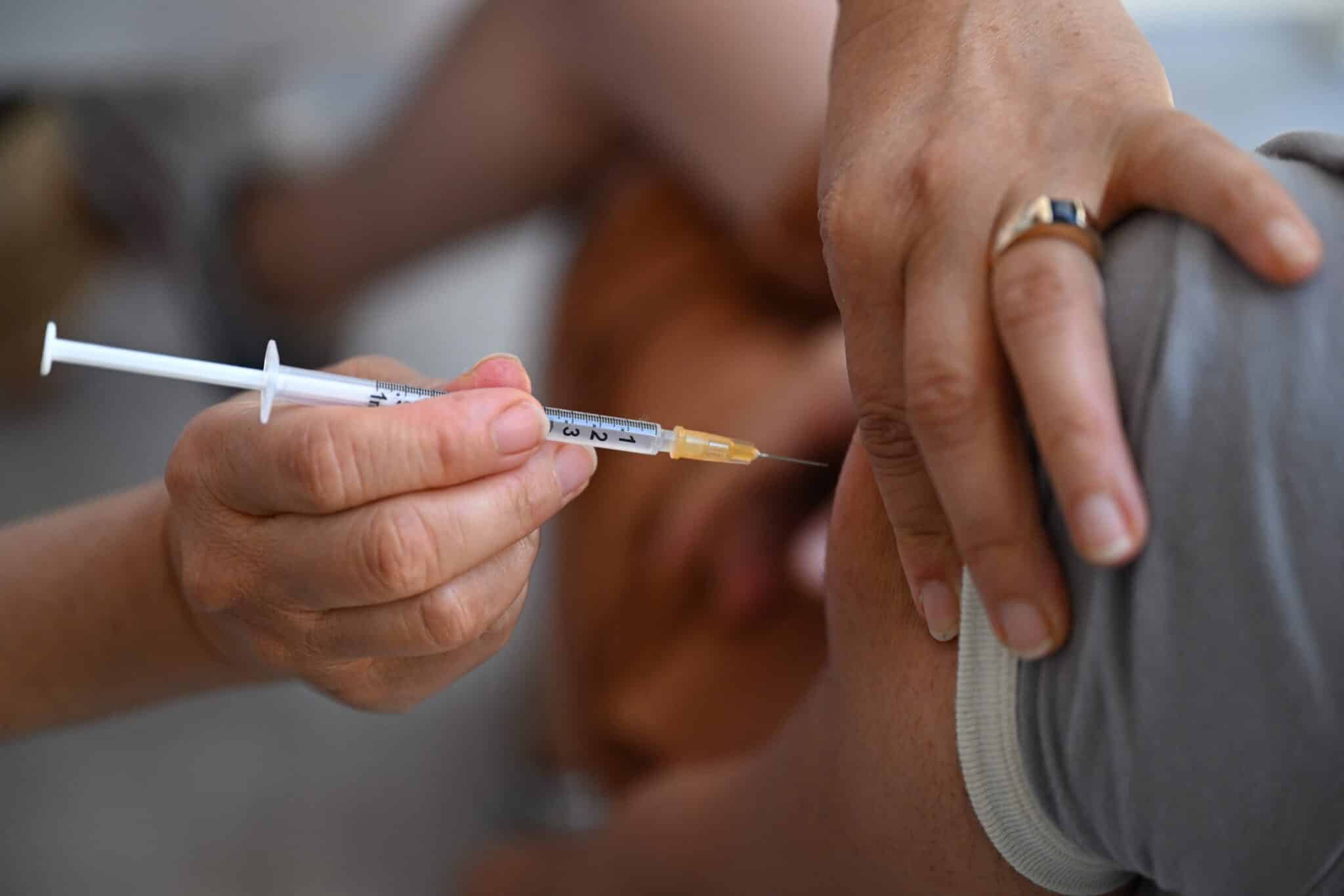UK government is ‘missing in action’ after six months of monkeypox, charities say

Medical syringes and a bottle are seen with a ‘Monkeypox’ sign. (NurPhoto via Getty/ Jakub Porzycki)
Almost half a year into the UK’s monkeypox outbreak, charities and sexual health services are warning the government is “missing in action”.
When the first monkeypox cases were detected in May, the UK Health Security Agency (UKHSA) and the sexual health sector leaped into action. Since then, thousands of gay and bisexual men have received vaccines, and transmission has dropped.
But then cracks started to appear.
First, the UK ran out of vaccines – then the Terrence Higgins Trust announced it was withdrawing from meetings with the UKHSA over “serious concerns” about its “communication and health promotion approach to monkeypox”.
Tensions between the UKHSA and sexual health services are now reaching a fever pitch, with advocates worried a lack of funding and an over-reliance on charities is impeding the wider monkeypox response.
“The phrase that we’ve used unfortunately quite a few times is that the government is missing in action when it comes to the monkeypox outbreak,” Ceri Smith, head of policy and communications at the Terrence Higgins Trust, tells PinkNews.
Smith says government oversight has been “desperately lacking” in the UK’s monkeypox response. She wants to see a single person appointed to oversee the government’s response to the outbreak.
She also wants the government to find funds for a targeted communications campaign that would reach greater numbers of gay and bisexual men
“We’ve been consistent – there’s a real need to make sure that there is targeted information produced and communicated in a way that reaches everyone who’s at high risk of exposure to monkeypox,” she says.
“You can’t have communications that just happen to mention gay and bisexual men. It can’t be just about using organic methods through Twitter and other social media channels.”
‘Not enough progress’ on monkeypox
She says the Terrence Higgins Trust decided to withdraw from meetings with the UKHSA after they wrote to its chief executive Jenny Harries in early September expressing concern. They waited for over a month for a response before issuing a statement.
“That’s why we decided that our concerns aren’t being taken seriously enough by the UKHSA at the moment. We hope things change, we stand ready and willing to support a good communications strategy.”
“We felt that we needed to take a stand on this issue because after five months we haven’t seen enough progress. We felt that it was misleading of us to continue to be involved when those meetings weren’t translating into action.”
Responding to the criticism, UKHSA incident director Dr Will Morton said: “With thanks to Terrence Higgins Trust and other LGBT+ and sexual health partners, there is very high awareness of the disease, its symptoms and how to seek help and prevent transmission among those at higher risk.
“We are not complacent and will ensure that everyone has the information they need to stay safe.”

A person receiving a vaccine. (Christophe Simon/AFP via Getty)
But Smith isn’t convinced. She’s calling on the agency to step up its game and put the focus back on eradicating monkeypox from the UK.
“This is our chance to stop it from becoming endemic,” she says.
That’s echoed by Danny Beales, head of policy and campaigns at the National AIDS Trust. He says charities and sexual health services have been doing the “heavy lifting” when it comes to monkeypox communications.
“The gay and HIV community has really led the response. It’s great to see the community banding together to face this health challenge, but it shouldn’t be the case that it’s up to the community and charitable organisations alone to communicate without funding.”
‘Slowness to act’
Beales says there’s been a “slowness to act” within the UKHSA, and he worries the agency isn’t taking the outbreak as seriously as it should be.
“I think there needs to be real questions about why the same level of resourcing and attention has not gone into meeting this challenge compared to other recent health challenges, whether it be coronavirus or recent polio outbreaks.
“It definitely doesn’t feel like we’ve done everything possible to minimise harm and put us in a good position to eradicate monkeypox in the UK.”
Beales is also concerned that charities like the National AIDS Trust are having to divert attention and funds away from their routine work so they can respond to monkeypox. Meanwhile, the government refuses to allocate additional resources.
‘Taking credit’ for charities’ work
“There has been a lot of good work by sexual health services to get the vaccine out, but none of it has been funded,” he says.
“It’s work they’ve done instead of doing other work. A lot of that work and outreach to sex parties, Pride events and to Black Pride has been done by the sector and again, done unfunded.
“It’s quite ironic that national bodies are taking credit for work they’ve not funded and not resourced properly.”
Now is not the time for complacency, Beales says. He worries case numbers will start going up again soon as the government is currently relying on gay and bisexual men abstaining from sex with new partners to keep transmission down.
“That’s not going to be a long term strategy for managing monkeypox, so I think quite clearly we need to get the vaccine out to everybody who needs it,” he says.
“There’s no resources for that at present – we need a proper resourced strategy with a leader who’s accountable.”
PinkNews has contacted the UKHSA for comment.

